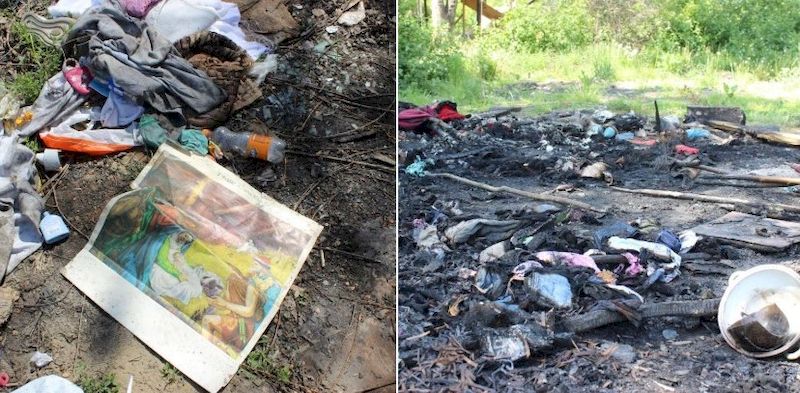Another Roma camp attacked and burned down in Ukraine, with police seeing only ‘hooliganism’

A permanent Roma settlement in Rudne, near Lviv, was burned down on 9 May, leaving a number of families homeless. It was the second attack on a Ukrainian Roma camp in less than a month, although this time nobody has publicly admitted to carrying it out.. While Ukraine’s Human Rights Ombudsperson clearly views this as a hate crime, and witnesses speak of a crowd of around 30 young masked thugs, the police have thus far only initiated an investigation into suspected ‘hooliganism’.
Hromadske Radio spoke with Mykhailo Kenyo from the Committee for the Defence of Human Rights, who explained that the Roma at Rudne lived at the camp throughout the year. There had been a previous attack last autumn when members of the camp were beaten up and the camp itself set alight. Nobody was arrested for the violence.
Kenyo explained that they were gathering up children at another camp in order to teach them to read and that he had dropped by the Rudne camp to see if everything was OK. It wasn’t since one of the children was ill, and there wasn’t enough to eat. He brought food and money for medicine and left, and says that it was immediately after he departed that the attack began. Like last autumn, it was in the night.
There are now no Roma living at the camp – they either fled in the night or were taken away by ambulance, in at least one case, after being beaten by the assailants.
Witnesses, speaking on condition of anonymity, reported that the attack was carried out by up to 30 young men of athletic build wearing masks.
Hromadske has also learned from its own sources that residents of this camp, as well as two others, had been warned of the planned attack several days before it.
The advance warning is just one of a number of factors that make it difficult to take the criminal proceedings under ‘hooliganism’ seriously.
Residents of the camps nearby are afraid to speak to the media, fearing that this could lead to them being next. They did, however, say that the attack had taken place at 2 a.m. and that people had not had time to grab official documents and money. The warnings also suggested that a neighbouring Metro supermarket as well as owners of plots of land in the area wanted to burn down the camp.
There are several echoes from the events on Lysa Hora in Kyiv on 21 April. One is, unfortunately, the reaction of the local authorities and police who initially denied any knowledge of the incident. Friends of the Roma who were living at the camp (and whose whereabouts are presently unknown) assert that the police were called Apparently they told one of the men that they could write a formal complaint, but the person had been too frightened to do so.
On 10 May, Ukraine’s Ombudsperson Ludmila Denisova or her Office issued a statement about what she said were not isolated cases involving xenophobia. The message specifically mentions the burning of the Roma camp at Rudne and says that “such demonstrations of xenophobia need particular attention from the police, including a more thorough investigation, as well as measures of a preventive nature to stop such cases in future”.
The following day the police in Lviv initiated a criminal investigation, but for the moment only on suspicion of ‘hooliganism’.
It took the police in Kyiv even longer to initiate criminal proceedings after the C14 attack on the Roma camp at Lysa Hora.
As reported, the effective pogrom and burning of the camp took place on 20-21 April, with C14 activist Serhiy Mazur describing it in detail on his Facebook page. While Mazur kept talking about action “within the framework of the law”, etc., he also spoke of the camp residents having been issued with an ‘ultimatum’, and warned that there would be a different approach if they didn’t comply.
Even the words written by a representative of this disturbing neo-Nazi movement should have sent alarm bells ring, as well as eliciting the strong suspicion that the Roma had been violently driven out.
Just hours before a video was released, which showed the C14 thugs driving Roma out, and doubtless traumatizing many children, the Head of the Kyiv Police still repeated earlier police claims that they had not received any complaints of violence or beatings.
After LB.ua released a video showing whole families running in terror from young men, many in masks, hurling stones and spraying gas canisters, the police finally reported that criminal proceedings had been initiated under Article 161 of Ukraine’s Criminal Code (violating citizens’ equal rights on the grounds of racial or ethnic identity, religion etc.), as well as Article 296 – hooliganism.
In both cases, as well as many in the past, only public attention seems likely to stop the investigations being quietly shelved and forgotten about.





